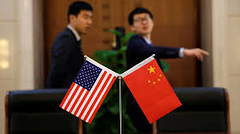China, U.S. trade talks – what the two sides proposed
07/05/2018 12:00

Top officials from China and the United States reached a consensus on some aspects of the countries’ trade row, but disagreements over other issues remain “relatively big”, according to the Chinese government on Friday.
The talks over the past two days have involved a high-level U.S. trade delegation led by Treasury Secretary Steven Mnuchin and senior Chinese officials, and followed months of threats and counter-threats from both sides in a series of disputes over trade practices.
Below are some key points from framework proposals put forward by the two countries at the start of the talks, according to sources with knowledge of the matter, and what is known of the outcome:
TARIFFS AND NON-TARIFF BARRIERS:
Chinese proposal: Said it would lower tariffs on some U.S. products, including cars.
U.S. proposal: Asked China to cut tariffs on all products to levels no higher than that of the United States. Washington will impose additional tariffs if China fails to comply with agreed-upon commitments.
What we know of outcome: The two sides exchanged opinions on solving tariff issues, Xinhua said. BILATERAL TRADE
Chinese proposal: China proposed increasing imports from the United States; asked U.S. to let its government and companies freely buy and use Chinese technology products and services; asked the U.S. to resume imports of cooked poultry from China.
U.S. proposal: Asked China to cut trade imbalance immediately and cut its trade surplus in goods with the United States by at least $200 billion (148 billion pounds) by 2020; asked China not to distort trade through investment restrictions and ensure any investment restrictions or conditions imposed by China were “narrow and transparent”.
What we know of outcome: The two sides exchanged opinions on expanding U.S. exports to China and bilateral services trade, said Xinhua. BILATERAL INVESTMENT:
Chinese proposal: Asked United States to treat Chinese investments equally under national security reviews; asked United States to stop issuing restrictions on new investments; agreed to implement its commitment to open up its financial and manufacturing sectors; proposed discussion on increasing film import quotas with U.S. and further opening up its Hainan free trade zone.
U.S. proposal: Asked China not to oppose, challenge, or otherwise retaliate against the United States’ imposition of restrictions on investments from China in sensitive U.S. technology sectors or sectors critical to U.S. national security, in light of China’s investment restrictions and state-directed investment in sensitive U.S. technology sectors, including industrial plans such as Made in China 2025; asked China to give U.S. investors in China fair, effective and non-discriminatory market access and treatment.
What we know of outcome: the two sides exchanged views on expanding two-way investment, according to Xinhua. INTELLECTUAL PROPERTY:
Chinese proposal: Requested United States terminate its Section 301 IP probe, not implement proposed 25 percent tariffs.
U.S. proposal: Asked China to protect U.S. IP by immediately ceasing market-distorting subsidies and other types of government support that can contribute to excess capacity in industries targeted by the Made in China 2025 plan; asked China to eliminate “specified policies and practices” with respect to technology transfer; asked China to agree to immediately cease the targeting of U.S. technology and IP through cyber operations, economic espionage, counterfeiting, and piracy, and abide by U.S. export control laws.
What we know of outcome: the United States and China exchanged views on IP protection, said Xinhua. ZTE:Chinese proposal: United States should listen to ZTE’s appeal on sanctions.
U.S. proposal: No mention
What we know of outcome: China lodged solemn representations on ZTE, the United States attached great value to those representations, Xinhua said.
AGRICULTURE:
Chinese proposal: China offered to consider new information provided by U.S. firms on Beijing’s anti-dumping probe on sorghum imported from the United States.
U.S. proposal: Asked China not to take any retaliatory action directed at imports of U.S. agricultural products in response to any U.S. actions, including any new U.S. restrictions on investments or imports; asked China to improve market access for U.S. agricultural products and U.S. services “in specified ways”.
What we know of outcome: No mention by Xinhua
Source: Reuters (By Michael Martina and Shu Zhang; Writing by Ben Blanchard and Ryan Woo; Editing by Alex Richardson)
The talks over the past two days have involved a high-level U.S. trade delegation led by Treasury Secretary Steven Mnuchin and senior Chinese officials, and followed months of threats and counter-threats from both sides in a series of disputes over trade practices.
Below are some key points from framework proposals put forward by the two countries at the start of the talks, according to sources with knowledge of the matter, and what is known of the outcome:
TARIFFS AND NON-TARIFF BARRIERS:
Chinese proposal: Said it would lower tariffs on some U.S. products, including cars.
U.S. proposal: Asked China to cut tariffs on all products to levels no higher than that of the United States. Washington will impose additional tariffs if China fails to comply with agreed-upon commitments.
What we know of outcome: The two sides exchanged opinions on solving tariff issues, Xinhua said. BILATERAL TRADE
Chinese proposal: China proposed increasing imports from the United States; asked U.S. to let its government and companies freely buy and use Chinese technology products and services; asked the U.S. to resume imports of cooked poultry from China.
U.S. proposal: Asked China to cut trade imbalance immediately and cut its trade surplus in goods with the United States by at least $200 billion (148 billion pounds) by 2020; asked China not to distort trade through investment restrictions and ensure any investment restrictions or conditions imposed by China were “narrow and transparent”.
What we know of outcome: The two sides exchanged opinions on expanding U.S. exports to China and bilateral services trade, said Xinhua. BILATERAL INVESTMENT:
Chinese proposal: Asked United States to treat Chinese investments equally under national security reviews; asked United States to stop issuing restrictions on new investments; agreed to implement its commitment to open up its financial and manufacturing sectors; proposed discussion on increasing film import quotas with U.S. and further opening up its Hainan free trade zone.
U.S. proposal: Asked China not to oppose, challenge, or otherwise retaliate against the United States’ imposition of restrictions on investments from China in sensitive U.S. technology sectors or sectors critical to U.S. national security, in light of China’s investment restrictions and state-directed investment in sensitive U.S. technology sectors, including industrial plans such as Made in China 2025; asked China to give U.S. investors in China fair, effective and non-discriminatory market access and treatment.
What we know of outcome: the two sides exchanged views on expanding two-way investment, according to Xinhua. INTELLECTUAL PROPERTY:
Chinese proposal: Requested United States terminate its Section 301 IP probe, not implement proposed 25 percent tariffs.
U.S. proposal: Asked China to protect U.S. IP by immediately ceasing market-distorting subsidies and other types of government support that can contribute to excess capacity in industries targeted by the Made in China 2025 plan; asked China to eliminate “specified policies and practices” with respect to technology transfer; asked China to agree to immediately cease the targeting of U.S. technology and IP through cyber operations, economic espionage, counterfeiting, and piracy, and abide by U.S. export control laws.
What we know of outcome: the United States and China exchanged views on IP protection, said Xinhua. ZTE:Chinese proposal: United States should listen to ZTE’s appeal on sanctions.
U.S. proposal: No mention
What we know of outcome: China lodged solemn representations on ZTE, the United States attached great value to those representations, Xinhua said.
AGRICULTURE:
Chinese proposal: China offered to consider new information provided by U.S. firms on Beijing’s anti-dumping probe on sorghum imported from the United States.
U.S. proposal: Asked China not to take any retaliatory action directed at imports of U.S. agricultural products in response to any U.S. actions, including any new U.S. restrictions on investments or imports; asked China to improve market access for U.S. agricultural products and U.S. services “in specified ways”.
What we know of outcome: No mention by Xinhua
Source: Reuters (By Michael Martina and Shu Zhang; Writing by Ben Blanchard and Ryan Woo; Editing by Alex Richardson)
Các tin khác
- Exports face challenges despite enjoying robust growth (26/04/2024)
- Vietnam ranks fifth among aquatic product suppliers for Singapore (26/04/2024)
- Some firms likely to close due to higher anti-dumping tariff on plywood products in S Korea (26/04/2024)
- Foreign businesses increasingly seek export sources in Vietnam (26/04/2024)
- Japan's investigation into China's graphite electrodes to 'affect regional cooperation' (26/04/2024)
 Home
Home
 About Us
About Us




















